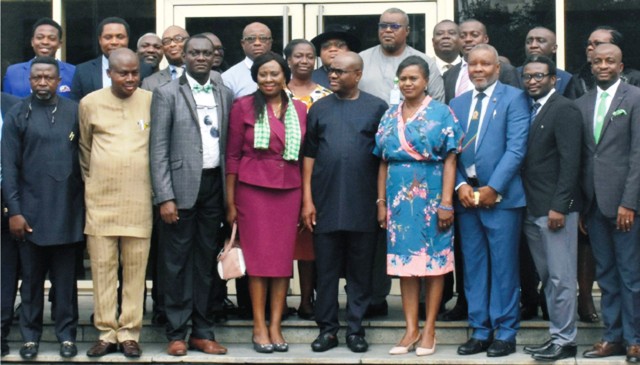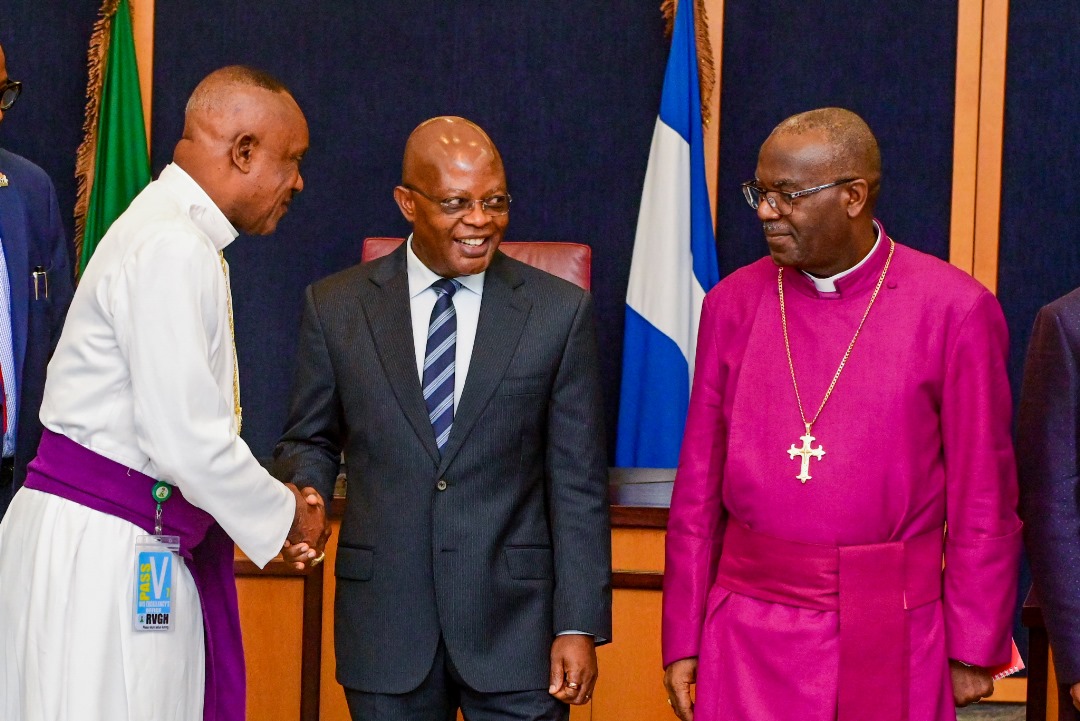Featured
NASS Jerks Up Budget, Okays N8.916trn …Approves N160bn For Minimum Wage, Others …Transmits Appropriation Bill To Buhari, ’Morrow

The National Assembly, yesterday, passed the 2019 Appropriation Bill of N8.916trillion, jerking up President Muhammadu Buhari’s earlier proposal to accommodate some extra funding for special projects.
The budget as passed indicates an increase of N90billion to the Appropriation Bill sum submitted on December 19, 2018.
According to separate reports presented by Chairmen of Appropriation Committees at both chambers, the N90billion increase in the budget profile would take care of N10billion intervention fund for victims of Zamfara crisis, N23.678 billion added as severance gratuity for outgoing federal lawmakers and their legislative aides, and about N66billion additional vote for the various security agencies for more potent war against all forms of crimes in the land.
Specifically, the Chairman of the Appropriation Committee in the Senate, Senator Danjuma Goje (APC Gombe Central), explained that the N23.678billion severance package for outgoing legislators also included induction programme/inauguration of the 9th Assembly.
Goje also explained further that to ensure the immediate implementation of the just approved N30,000 minimum wage for public servants, the N160billion proposed as service wide votes was appropriated under the public service wage adjustment for Ministries , Departments and Agencies (MDAs).
However, as recommended by the committees and approved by both chambers, all the parameters on which the budget estimates are based remain as proposed by the executive arm.
The parameters are $60 per barrel oil price benchmark, 2.3million barrel per day production level, and N350 to one US dollar as exchange rate.
Major highlights of the N8.916trillion 2019 budget passed by the National Assembly are N502.058billion for Statutory Transfers, N500billion for Special Intervention and N4.055trillion for recurrent expenditure.
Others are N2.094trillion for capital expenditure, N1.908trillion as fiscal deficit within the ambit of 1.37 per cent deficit to GDP (Gross Domestic Product).
Within the service-wide allocation in the approved budget, N65billion was appropriated for Presidential Amnesty Programme on reintegration of transformed ex-militants, N5billion earmarked for payment of outstanding death benefit to civil servants and police personnel, while N15billion was approved as additional support for universities.
Within the capital expenditure component of the budget, N394.906billion is earmarked for the Federal Ministry of Power, Works and Housing, N107.218billion for the Ministry of Agriculture and Rural Development, N159.125billion for Ministry of Defence, and N92.178bn for Ministry of Water Resources.
Others are, N58.689bn for Ministry of Education, N179.384bn for Ministry of Transportation, and N53.678billion for Ministry of Interior, among others.
However, in the recurrent expenditure component of the budget, the Ministry of Interior has the highest appropriated votes of N564.222billion, followed by Ministry of Education with N463.395billion.
In his remarks after passing the Appropriation Bill for third reading, the Senate President, Dr Bukola Saraki said: “With passage of this bill for third reading today, the Executive must ensure full implementation of the budget, sector-by-sector for the benefit and well-being of Nigerians”.
Meanwhile, the National Assembly yesterday approved N160bn for the payment of the new minimum wage for federal workers and payment of severance benefits.
The decision followed the unanimous endorsement of the 2019 Budget presentation by the lawmakers at separate plenaries which held simultaneously in both houses and presided over by Senate President BukolaSaraki and Speaker YakubuDogara at the National Assembly, Abuja.
Our correspondent reports that President Muhammadu Buhari had, on December 19, 2018, presented the 2019 Budget proposal of N8.83trn before the joint session of the National Assembly.
However, the Senate and the House of Representatives yesterday passed the 2019 Appropriation Bill, jacking it up from N8.83trn to N8.92trn with a N90bn increase.
Under other service-wide votes, item 90 of the Report of the Senate Committee on Appropriation on the 2019 Budget Bill, which reads: “public service wage adjustment for MDAs (including arrears of promotion and salary increases) and payment of severance benefits” has N160bnn as its budget.
Also, item 88 that reads: “payment of outstanding death benefit to civil servants/Police” has N5bn for the budget.
The Chairman, Senate Committee on Appropriation, Senator Danjuma Goje, while addressing newsmen shortly after the budget passage, affirmed that the N160 billion was to fund the minimum wage increase and severance benefits as stipulated in item 90 of the report.
Goje, however, stated that if the amount budgeted failed to meet the demand, the Federal Government could present a supplementary budget to cover the shortfall.
Our correspondent reports that the National Minimum Wage Bill, which was passed by the lower and upper house on January 29 and March 19 respectively, was signed into law by President Buhari on April 18.
The National Assembly, after a short break, resumed to pass the votes and proceedings of the day, and adjourned to Tuesday, May 6, 2019.
Meantime, the House of Representatives, yesterday, said the National Assembly would transmit the approved 2019 Budget of N8.916trillion to President Muhammadu Buhari, tomorrow.
The Chairman of the House Committee on Appropriation, Rep. Mustapha Dawaki, made this known while briefing newsmen after plenary in Abuja.
Dawaki explained that the increase in total budget from N8.83trillion was due to the inclusion of funds for “special interventions’’ made by the National Assembly.
He said that the interventions included the provision of N24.6billion as severance allowance for outgoing lawmakers and N10billion for Zamfara terrorism.
He said that the Christmas break and the general elections accounted for the delay in the passage of the budget.
“The President laid this budget on December 19, 2018, but certain extraneous forces such as the Christmas and New Year breaks also affected quick passage of the Appropriation Bill.
“And, don’t forget that we had to go on break to fully participate in the February polls; all these were distractions that really affected the passage of the Appropriation Bill.
“Hopefully, by Thursday, the budget will be transmitted to the president for his assent.
“We left the oil benchmark and exchange rate as sent by the Executive, except for the deficit which we adjusted,’’ Dawaki said.
Meanwhile, the Senate, yesterday, directed its Committee on Youth and Sports to investigate the alleged illegal appointment of a new Director-General for the National Youth Service Corps, NYSC.
It was also said that the Chief of Army Staff (COAS), Lt. Gen. Tukur Buratai unilaterally made the alleged unconstitutional but controversial appointment.
This development was sequel to an adopted order 42 and 52 Senate Rule moved by Senator Dino Melaye, representing Kogi West.
Melaye, in presenting his motion, said it was unconstitutional for Buratai to have made the said appointment as it was in breach of the provision of the 1999 Constitution as amended.
In his words, “I’m bringing to the notice of the Senate an infringement in the appointment of a new Director-General of NYSC.
“It was said that the Chief of Army Staff made a new appointment of NYSC Director-General in replacement of the former DG.
“This is unconstitutional as it is only the President of the Federal Republic of Nigeria that has the right as provided by the constitution to do so.
“The NYSC Act Section 5 reads, “There shall be a Director-General for the National Youth Service Corps to be appointed by the President.
“But Buratai through a signal removed and appointed a new NYSC DG.
“We should not allow this, Mr. President. Otherwise, we should not be surprised to wake up one morning to hear that DG, Nigerian Security and Civil Defence Corps (NSCDC) has been removed and appointed a new Senate President”.
However, Senator Bassey Akpan seconded the motion while it was put to a voice vote by Senate President, Dr Bukola Saraki that resulted in the unanimous resolution to refer the matter to its committee to investigate and report back next Wednesday for further legislative action.
Nneka Amaechi-Nnadi, Abuja
Featured
FG To Seize Retirees’ Property Over Unpaid Housing Loans

The Federal Government Staff Housing Loans Board says it has begun the compilation of list of retired civil servants who have defaulted on the full repayment of housing loans obtained.
Head of Information and Public Relations, FGSHLB, Mrs Ngozi Obiechina, disclosed this in a statement in Abuja, yesterday.
Obiechina quoted the Executive Secretary of the Board, Mrs Salamatu Ahmed, as saying that the move was aimed at recovering mortgaged properties from retirees who failed to meet their loan obligations.
Ahmed noted that the decision followed a recent memo issued by Mrs Patience Oyekunle, Permanent Secretary, Career Management Office, Office of the Head of the Civil Service of the Federation.
According to her, the memo reminded public servants of the mandatory requirement to obtain a Certificate of Non-Indebtedness to the FGSHLB and MDA Staff Multipurpose Cooperative Society as a precondition for retirement.
The Executive Secretary said that the board would take necessary legal steps to repossess properties where applicable, in line with the terms of the loan agreements.
She said this was in line with the provisions of the Public Service Rules 021002 (p), issued by the Office of the Head of the Civil Service of the Federation.
“I am directed to bring to your attention the provision of Public Service Rule (PSR) 021002 (p), which mandates all public servants to obtain a Certificate of Non-Indebtedness as a prerequisite for retirement.
“The Federal Government will commence the seizure of mortgaged properties belonging to retiring federal public servants who have failed to fully repay housing loans obtained from the board,” she said.
Ahmed explained that the FGSHLB reserves the legal right to repossess any mortgaged property in cases where a public servant exits service without fully repaying the loan.
She reiterated that the directive also applied to already retired officers who were still indebted.
She urged all affected public servants to regularise their loan status and obtain the required clearance certificate without delay.
“The board is currently compiling a list of such retirees, which will be forwarded to relevant regulatory agencies for debt recovery.
“The FGSHLB remains committed to enforcing compliance and ensuring proper loan recovery procedures are followed, “ she added.
Featured
FG Begins Induction For New Permanent Secretaries, Accountant-General

The Federal Government has kicked off a three-day induction programme for newly appointed Permanent Secretaries and the Accountant-General of the Federation, aimed at equipping them for strategic leadership and effective policy implementation.
The induction, according to a statement yesterday by the Director, Information and Public Relations, Federal Ministry of Information and National Orientation, Eno Olotu, which commenced on Wednesday, is being held at the National Counter Terrorism Centre in Abuja.
Speaking at the opening session, the Head of the Civil Service of the Federation, Mrs. Didi Esther Walson-Jack, congratulated the new appointees and described their roles as pivotal to governance and national development.
“Permanent Secretaries are the engine room of the government. They are critical to driving policy implementation, institutional performance, and reform across the service”, she said.
The Federal Government has kicked off a three-day induction programme for newly appointed Permanent Secretaries and the Accountant-General of the Federation, aimed at equipping them for strategic leadership and effective policy implementation.
The induction, according to a statement yesterday by the Director, Information and Public Relations, Federal Ministry of Information and National Orientation, Eno Olotu, which commenced on Wednesday, is being held at the National Counter Terrorism Centre in Abuja.
Speaking at the opening session, the Head of the Civil Service of the Federation, Mrs. Didi Esther Walson-Jack, congratulated the new appointees and described their roles as pivotal to governance and national development.
“Permanent Secretaries are the engine room of the government. They are critical to driving policy implementation, institutional performance, and reform across the service”, she said.
“The expectations are high, and the responsibility is immense. But with commitment and teamwork, we can deliver a more efficient, accountable, and citizen-centred public service.
“This final lap of FCSSIP 25 calls for urgency, accountability, and strategic focus. You must translate vision into measurable results,” she stated.
In her welcome address, the Permanent Secretary, Career Management Office, Mrs. Fatima Sugra Tabi’a Mahmood, described the programme as a strategic investment in leadership capacity and institutional effectiveness.
The sessions featured expert-led discussions, simulations, and strategic briefings facilitated by a distinguished faculty, including Engr. Suleiman Adamu, former Minister of Water Resources; Dr. Hadiza Bala Usman, Special Adviser to the President on Policy and Coordination; Mrs. Beatrice Jedy-Agba, Solicitor-General of the Federation and Permanent Secretary, Federal Ministry of Justice; Alh. Yusuf Addy, retired Federal Director; Alhaji Bukar Goni Aji, former Head of the Civil Service of the Federation; Amb. Mustapha Lawal Suleiman, Mr. Adesola Olusade, and Dr. Ifeoma Anagbogu, all retired Permanent Secretaries.
Participants include Dr. Obi Emeka Vitalis, Mrs. Fatima Sugra Tabi’a Mahmood, Mr. Danjuma Mohammed Sanusi, Mr. Olusanya Olubunmi, Dr. Keshinro Maryam Ismaila, Dr. Akujobi Chinyere Ijeoma, Dr. Umobong Emanso Okop, Dr. Isokpunwu Christopher Osaruwanmwen, Mrs. Oyekunle N. Patience, Dr. Kalba U. Danjuma, Mr. Nadungu Gagare, Mr. Onwusoro I. Maduka, Dr. Usman Salihu Aminu, Mr. Ogbodo Chinasa Nnam, Mr. Ndiomu Ebiogeh Philip, Dr. Anuma N. Ogbonnaya, Mr. Adeladan Rafiu Olaninre, and Mr. Mukhtar Yawale Muhammed, alongside the Accountant-General of the Federation, Mr. Shamseldeen Babatunde Ogunjimi.
The induction programme will feature sessions on public sector leadership, policy delivery, ethics in service, digital transformation, and performance management.
Featured
NNPCL To Undergo Forensic Audit Soon -FG

The Minister of Finance and Coordinating Minister of the Economy, Wale Edun, has announced that a forensic audit of the Nigerian National Petroleum Company Limited (NNPCL) will begin soon.
Edun revealed this at the ongoing Nigerian Investor Forum, held alongside the IMF/World Bank Spring Meetings in Washington DC.
The minister explained that the recent changes in the NNPCL management are part of a broader effort by the Federal Government to clean up and examine the company closely.
While addressing top global investors, including representatives from J.P. Morgan, Edun shared key reforms the government has introduced to revive the economy and restore investor confidence.
He told the investors that the government’s bold economic steps have laid a strong foundation to attract private investment.
He stated, “Our goal is not just to maintain this momentum, but to accelerate it. We are targeting seven per cent annual growth, and we believe the policies we have implemented have laid the groundwork to achieve this.”
Edun highlighted that President Bola Tinubu’s administration has rolled out major reforms that are already making a difference.
He added that the Nigerian economy grew by 3.84 per cent in the fourth quarter of 2024 and recorded a 3.4 per cent growth for the year.
Edun further stressed the importance of the reforms, describing them as “unprecedented,” adding that, “We said we would do it, and now we have done it. This time, we’re staying the course.”
He pointed out signs of progress such as lower budget deficits, a better trade balance, and a more stable exchange rate.
He also said that the focus is now on growing key sectors, especially agriculture.
According to Edun, agriculture is at the top of the government’s agenda, with the aim of improving food supply and increasing productivity.
“We aim to close the food supply gap, not by importing more, but by enabling domestic producers to scale and innovate,” he said.
On infrastructure, Edun revealed that the government has rolled out 90,000km of fibre optic cable to improve internet access.
He said this move is crucial for supporting young Nigerians and tech startups.
He also noted that 4,000km of roads have been offered for private sector participation, with the first 1,000km already approved for construction.

